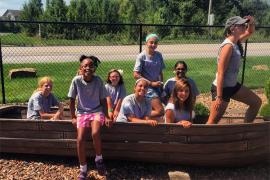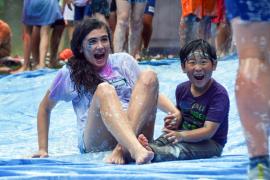Hello camp community!
It’s June, which means you are in it — whether you are in your final days of pre-camp preparations or already welcoming campers, you are in it. When I was a camp director, my early June days were minute-to-minute, right-here-right-now, game face. The last thing I would think about this time of year would be the future.
But what Jessie shares with us in this blog is all about the future. And why on earth should you step away from being so in it to think about the future? Well, for no other reason than that reading this post will give you a moment to think differently than you are 12+ hours a day right now. It might also give you a chance to breathe. And it might also give you a sense of the larger community of which you are a vital member. This post will give you insight into how other members of the camp community — in this case, camp researchers — are in it with you.
In this blog, Jessie describes how camp researchers and camp professionals came together at the 2019 ACA National Conference to envision a future for camp research.
Here’s Jessie:
This past February at the ACA National Conference in Nashville, the University of Utah and the American Camp Association hosted the Future of Camp Research Think Tank pre-conference workshop. The workshop aimed to envision the future of camp research and its application through generative discussion between camp professionals and researchers, the perspectives of invited panelists, and through the lens of past and current camp research.
This conference was my first experience at a conference as a “researcher.” I’ve attended the ACA National Conference in the past as an undergraduate and hopeful camp professional. The conference for me back then was comprised of attending different programming sessions (one I remember most is participating in and learning about icebreakers with Jennifer Stanchfield). This year, as a first-year master’s student and research assistant at the University of Utah, I was able to experience the conference in a whole new way, laying my new “researcher” lens over my comfortable and well-loved “practitioner” lens.
Attending this pre-conference workshop was a great way to start the conference for me with my new lenses. Through the collaborative effort between moderators, Dr. Jim Sibthorp from the University of Utah and Dr. Laurie Browne from the American Camp Association, the five research and development professionals that made up the panel, and the practitioner representatives across all different types of ACA accredited camps, the group came up with a list identifying the current trends, issues with access/equity/inclusion, in camp research and, more specifically, getting camp research to practitioners.
Trends
- Staff turnover: retention vs. staff development
- Mental/emotional health; social issues in staff and campers
- Having access to good care
- Camp as therapy
- Technology/video games
- The camp experience across gender
- Male enrollment in day camp
- Parents: high expectations, anxiety, and disconnection
- Transitions in and out of camp to enhance learning
- Ability to reach across children of different races/ethnicity
Access, Equity, and Inclusion
- Overcoming cultural barriers for campers/families
- How is camp perceived? Is it valued? Safe?
- Understanding cultural traditions and how camp might not fit into those
- Communication with parents/campers, building trust
- Belonging for everyone
- Support across progression and development spectrums
- Staff training on cultural ability
- Role of CIT as pathway
- Tools/best practices
- Thoughtfulness in representation
- How can camp be an ally for underrepresented communities?
Bridging Research to Practice
- Access and translation: google scholar, ACA newsletters and website, community collaboratives (regional ACA groups)
- Translation from other fields (i.e. education) to camp
- Using new delivery techniques (videos, infographics)
- Conference proceedings
- Accessible language
Finally, the practitioner representatives in attendance were asked to brainstorm what research is needed to help support or overcome the ideas and challenges listed above.
What Research Is Needed?
- What are the best strategies for connecting with families?
- Research on 5-8-year-olds; younger ages for day camps
- How to create a sense of belonging for historically and typically underrepresented groups? Does it exist? What at camps enable/prevent feelings of belonging?
- How do we evaluate experience and the elements that contribute to deeper-level experiences?
- More research on day-to-day observations and the smaller moments at camp
For me, this pre-conference workshop was a great way to wear both lenses (practitioner and researcher) at the same time. There are so many great resources out there to strengthen the programs that drive the positive youth development that camps are striving for. ACA is working hard to create more of these resources. So, going into your summer, I urge you to try on a researcher lens. Look at your camp programs critically and ask questions. Why are the programs the way that they are? How do we help our staff understand why we run camp the way we do? Do you see any of the identified trends and challenges above? How is your camp working to overcome and utilize those? Through bridging that gap between research and practice, through trying on both lenses, we can continue to offer programming that supports positive development in all kids in our communities.
Jessie Dickerson is a master’s student at the University of Utah studying youth development through adventure education. Before moving to Utah, she was the adventure coordinator for ACA-accredited Camp Ondessonk in Southern Illinois. Prior to that position, she lived in five states with various recreation jobs, graduated from Southern Illinois University with her Bachelor’s in Outdoor Recreation Leadership and Management, and has been involved in summer camps for ten years.
Thanks to our research partner, Redwoods.
Additional thanks goes to our research supporter, Chaco.
Photo courtesy of Camp Roger in Rockford, MI

